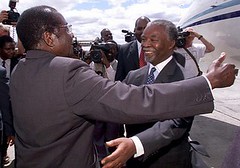
Zimbabwe President Robert Mugabe greeting former South African President Thabo Mbeki. The two leaders are working on a unity government plan for Zimbabwe.
Originally uploaded by Pan-African News Wire File Photos
Zimbabwe Chronicle Reporter
THE pledge of 300 million rand by the South African government towards Zimbabwe’s agricultural inputs scheme for this farming season is an indication of the cordial relations that exists between the two neighbours, a diplomat said yesterday.
In a statement yesterday, Zimbabwean Ambassador to South Africa, Cde Simon Khaya Moyo, said the development was a clear demonstration of the solid relations enjoyed by the two countries.
“We must maintain this unity of purpose as indeed and as often stated we are one people, sharing a common liberation history, culture and identity. SIMUNYE,” he said.
“Let those in the farming sector prove their worth, for this farming season must mark a turning point in our economic recovery strategy.”
On Tuesday, South Africa’s Finance Minister, Mr Trevor Manuel, announced aid to Zimbabwe under the Foreign Affairs vote in his budget statement.
Mr Manuel said the money was expected to “mitigate the impact of high food prices’’ and “assist in meeting Zimbabwe’s short-term food requirements’’.
The announcement of the South African aid package comes at a time when there are forecasts that most parts of Zimbabwe would receive substantial rainfall in mid-November.
The Minister of Agriculture, Cde Rugare Gumbo, recently revealed that the Government bought more than 30 000 tonnes of seed maize out of the 50 000 tonnes needed for planting two million hectares of maize for the 2008/2009 cropping season.
The South African assistance would augment such Government efforts.
Cde Gumbo said importation of fertilisers and agro-chemicals had also resumed in preparation for summer cropping.
Although Zimbabwe has invested heavily in the mechanisation of the agricultural sector as well as sourcing of farm inputs, the country has been plagued by misfortunes such as droughts and other unfavourable climatic conditions, a situation aggravated by Western sanctions imposed on Harare over the land reform programme.
This has resulted in the Government having to spend huge amounts in foreign currency on the importation of maize as a food security measure.
Last year a fact-finding team led by the Southern African Development Community Executive Secretary-General, Mr Tomaz Salamao, carried out a study in Zimbabwe and concluded that contrary to Western countries’ assertion that the sanctions were “targeted’’ or “smart’’, they were hurting the ordinary Zimbabwean.
SADC is on record as calling for the lifting of the sanctions, which have seen Zimbabwe being unfairly denied balance of payments support even if it has been meeting some of its financial obligations with Bretton Woods Institutions like World Bank and International Monetary Fund controlled by United States and its Western allies.
The regional body also recommended that an economic package to assist Zimbabwe get back on its feet was necessary.
South Africa has always maintained that being a good neighbour, it can not sit and watch while Zimbabwe suffers and has been in the forefront of getting Zimbabwe’s political gladiators to have dialogue that would come up with solutions to the country’s economic challenges.
Reports from South Africa said the aid pledged by the neighbouring country was “subject to acceptance of the appropriate role for international food relief agencies by a recognised multi-party government’’.
Zimbabwe’s main political parties, Zanu-PF and the two MDC formations signed a power-sharing agreement that would result in the formation of an all-inclusive Government.
However, implementation of the deal has been stalled by a dispute over the allocation of Cabinet portfolios among the three parties.
No comments:
Post a Comment